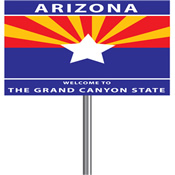 The Grand Canyon State requires that motorists must show proof of financial responsibility before a vehicle can be registered in AZ; the state allows consumers to a few different ways to comply. Motorists have the choice to purchase a bond, certificate of deposit or deposit cash in the amount of $40,000 with the state; since this is not generally feasible since the average consumer does not have this amount of money lying around, therefore most residents choose to purchase an auto insurance policy in order to be in compliance with the law.
The Grand Canyon State requires that motorists must show proof of financial responsibility before a vehicle can be registered in AZ; the state allows consumers to a few different ways to comply. Motorists have the choice to purchase a bond, certificate of deposit or deposit cash in the amount of $40,000 with the state; since this is not generally feasible since the average consumer does not have this amount of money lying around, therefore most residents choose to purchase an auto insurance policy in order to be in compliance with the law.
For those who choose to purchase Arizona car insurance policies rather than the other options available, minimum limits of coverage are required. Motorists must carry a policy consisting of liability limits of no less than $15,000 per person and $30,000 per accident for Bodily Injury and $10,000 per accident for Property Damage. Consumers should keep in mind that these limits are the absolute minimums and more extensive coverage can be purchased if one desires. In addition, the state does not require that motorists carry coverage for physical damage to their automobiles and the state required limits on the insured’s policy do not cover any injuries or damages that they may sustain.
Arizona is one of the states that allow auto insurance companies to use an applicant’s credit history to calculate rates, determine eligibility for a policy and even deny coverage. Carriers strongly believe that a person’s “bill paying” habits show a direct correlation of the likelihood of maintaining policies and the risk of a loss; providers have gone as far as compiling statistical data to show the correlation between the two. According to insurers, those who have a less than a perfect credit history are more likely to file a claim and are considered as riskier to insure, therefore they may be charged higher rates or denied coverage. For more information, consumers can view the state’s publication titled “Understanding How Insurers Use Credit
Information“.
Motorists should also be aware of the legitimate reasons for cancellation or non renewal of policies and their rights as consumers. After a policy has been in force for over 60 days there are certain reasons that state law will allow companies to cancel car insurance polices; these reasons include non payment, obtaining a policy through fraudulent misrepresentation or if the policy issued would jeopardize the solvency of the carrier, among other reasons. Consumers should check with the state if coverage is cancelled to make sure that it was done lawfully; if policies have been cancelled or denied renewal legally, motorists should be sure to get new coverage as soon as possible and not risk driving uninsured.